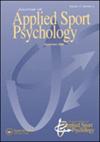Psychological skills training and perfectionism: A single-subject multiple baseline study
IF 2.7
2区 心理学
Q2 HOSPITALITY, LEISURE, SPORT & TOURISM
引用次数: 0
Abstract
Abstract Psychological skills training (PST) is a common and effective form of support provided by sports psychologists. Nevertheless, its use in helping support athletes with perfectionism and some of the problematic issues they can face is unknown. The purpose of the present study was to assess the effectiveness of PST in reducing perfectionistic cognitions and improving emotional experiences in athletes. Using a single-subject multiple baseline research design, we recruited five national-level basketball players (M = 21.8 years) based on their concerns over mistakes (a key dimension of perfectionistic concerns). All participants received eight, one-to-one PST sessions over a four-week period. Participants completed self-report measures of perfectionistic cognitions, cognitive appraisals, pre-competition emotions, and performance satisfaction on a weekly basis, before, during, and after the intervention, as well as 3-months later. Results suggested that PST improved at least some of the cognitive appraisals, pre-competition emotions, and performance satisfaction in most participants. Minimal changes were observed for perfectionistic cognitions. The findings support the general use of PST but other interventions may be required to reduce perfectionistic cognitions. Lay summary: Perfectionistic concerns are related to performance and well-being difficulties in athletes. We used a short PST intervention to examine if it can improve the experiences of athletes selected based on their concern over mistakes. The intervention was effective for some aspects of their experiences, such as pre-competition emotions and performance satisfaction but less effective for the perfectionistic cognitions they reported. IMPLICATIONS FOR PRACTICE Sport psychologists are better informed as to the effectiveness of PST when working with athletes. The effectiveness of PST varies based on the individual and the intended outcome. There is a need for more expert guidance on perfectionism for training sports psychologists.心理技能训练与完美主义:一项单主体多基线研究
摘要心理技能训练是运动心理学家提供的一种常见而有效的支持形式。尽管如此,它在帮助支持完美主义运动员以及他们可能面临的一些问题方面的作用是未知的。本研究的目的是评估PST在减少运动员完美主义认知和改善情绪体验方面的有效性。采用单受试者多基线研究设计,我们招募了五名国家级篮球运动员(M = 21.8 年)基于他们对错误的担忧(完美主义担忧的一个关键维度)。所有参与者在四周的时间里接受了八次一对一的PST会议。参与者每周、干预前、干预中、干预后以及干预后3个月完成完美主义认知、认知评估、赛前情绪和表现满意度的自我报告测量。结果表明,PST至少改善了大多数参与者的一些认知评估、赛前情绪和表现满意度。完美主义认知的变化很小。研究结果支持PST的普遍使用,但可能需要其他干预措施来减少完美主义认知。 总结:完美主义问题与运动员的表现和幸福困难有关。我们使用了一个简短的PST干预来检查它是否可以改善基于对错误的担忧而选择的运动员的体验。干预对他们体验的某些方面有效,如赛前情绪和表现满意度,但对他们报告的完美主义认知效果较差。运动心理学家在与运动员合作时,会更好地了解PST的有效性。PST的有效性因个人和预期结果而异。需要更多关于完美主义的专家指导来培养运动心理学家。
本文章由计算机程序翻译,如有差异,请以英文原文为准。
求助全文
约1分钟内获得全文
求助全文
来源期刊
CiteScore
6.90
自引率
9.40%
发文量
39
审稿时长
>12 weeks
期刊介绍:
The Journal of Applied Sport Psychology (JASP) is a refereed journal designed to significantly advance thought, theory, and research on applied aspects of sport and exercise psychology. Submissions such as experimental studies, qualitative research, correlational studies, case studies, position papers, critical reviews, theoretical developments specific to applied research conducted in sport and/or exercise settings, or having significant applied implications to sport and exercise, are appropriate content for the JASP. Please see the recent Editorial for further details on the aims and scope of the journal. JASP is a non-proprietary journal that is an official publication of the Association for Applied Sport Psychology (AASP). The purpose of AASP is to promote the development of psychological theory, research, and intervention strategies in sport and exercise psychology. The Journal is a direct benefit of membership in AASP and is received by its student and professional members. The publisher of the JASP is Taylor and Francis, Inc. of Philadelphia, PA.

 求助内容:
求助内容: 应助结果提醒方式:
应助结果提醒方式:


